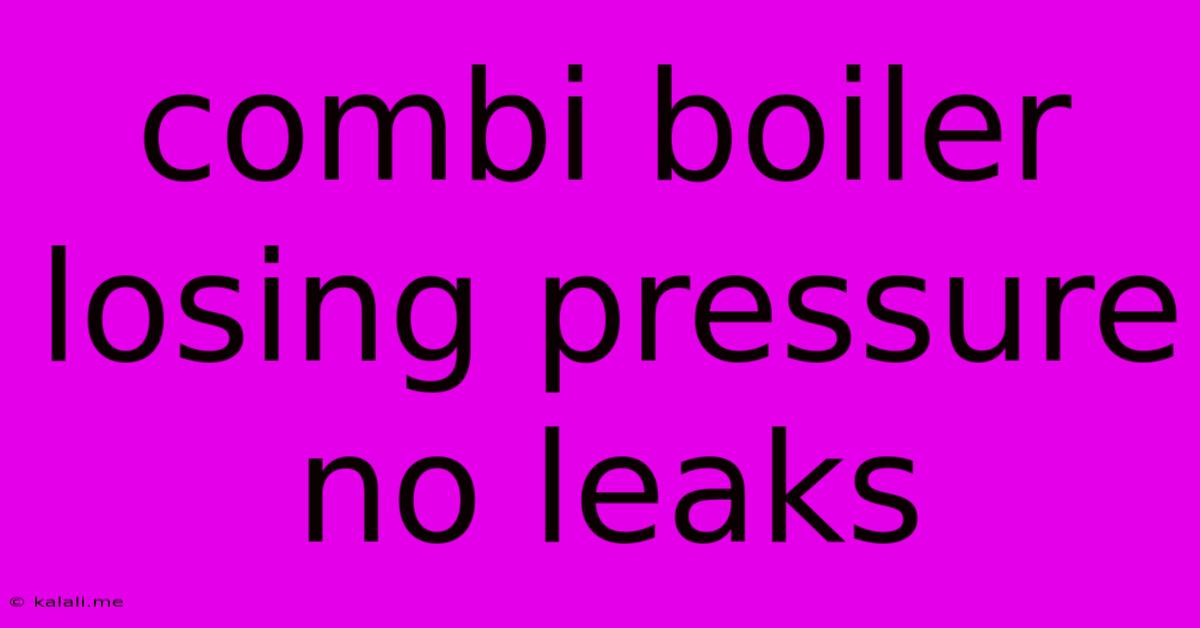Combi Boiler Losing Pressure No Leaks
Kalali
May 22, 2025 · 3 min read

Table of Contents
Combi Boiler Losing Pressure: No Leaks, No Panic! A Troubleshooting Guide
Meta Description: Is your combi boiler losing pressure despite no visible leaks? Don't panic! This guide explores common causes, from simple fixes like topping up the pressure to more complex issues requiring professional help. Learn how to troubleshoot and maintain your boiler's pressure effectively.
A combi boiler losing pressure without any apparent leaks can be a frustrating problem. It disrupts hot water and heating, leaving you cold and potentially impacting your energy bills. However, before you call an expensive engineer, let's explore the common culprits and how to tackle them. This guide will walk you through troubleshooting steps, helping you identify the source of the pressure drop and, in many cases, fix it yourself.
Understanding Combi Boiler Pressure
Before we dive into troubleshooting, it's important to understand what pressure in your combi boiler actually means. The pressure gauge, usually found on the boiler itself, indicates the pressure of the water within the system. A healthy pressure typically sits within a specific range, usually indicated on the boiler's manual (often between 1 and 1.5 bar). A consistently low pressure suggests a problem needing attention.
Common Reasons for Pressure Loss (No Leaks)
Several factors can cause your combi boiler pressure to drop, even without visible leaks:
-
Expansion Vessel Issues: This is a common culprit. The expansion vessel is a component that absorbs the expansion of water as it heats up. If it's failing, it won't absorb this expansion, causing pressure to drop. This often requires professional repair or replacement.
-
System Leaks (Hidden): While you may not see obvious leaks, tiny leaks can still occur within walls, under flooring, or within pipework. These microscopic leaks are difficult to spot but lead to gradual pressure loss. A pressure test by a professional can pinpoint these.
-
Component Failure: Faulty pressure relief valve, a leaking diverter valve, or problems within the heat exchanger itself can all contribute to pressure loss. These usually require professional intervention.
-
Air in the System: Air trapped in the central heating system can cause pressure fluctuations. This is often indicated by gurgling noises from the radiators. Bleed your radiators to release trapped air.
Troubleshooting Steps:
-
Check the Pressure Gauge: First, simply note the pressure reading. Is it consistently low? If it's within the acceptable range, you likely don't have a problem.
-
Top Up the Pressure (If Necessary): If the pressure is low, consult your boiler manual for instructions on how to safely top up the pressure using the filling loop. This is usually a simple process, but always follow the instructions carefully.
-
Bleed Your Radiators: Gently bleed each radiator to release any trapped air. This can often resolve pressure fluctuations caused by air in the system. Listen for a hissing sound; once a steady stream of water emerges, tighten the bleed valve.
-
Check for Obvious Leaks (Again!): Thoroughly inspect all visible pipes and connections for any signs of leakage, even small drips.
When to Call a Professional
If, after trying these troubleshooting steps, your combi boiler continues to lose pressure, it's best to call a qualified heating engineer. Ignoring the problem could lead to further damage or even boiler failure. A professional can perform a pressure test to pinpoint the exact location of any leaks, and they possess the expertise to repair or replace faulty components like the expansion vessel or other internal parts.
Preventing Future Pressure Loss
Regular boiler servicing is crucial for preventing pressure loss and maintaining optimal performance. A yearly service identifies potential problems before they escalate into major repairs. This preventative maintenance ensures your boiler operates efficiently and safely, extending its lifespan and preventing unexpected breakdowns. Understanding your boiler's pressure and conducting regular checks can significantly contribute to its longevity and reliable operation.
Latest Posts
Latest Posts
-
How Many Words Is A 200 Page Book
May 22, 2025
-
Harry Potter 5 7 Dark Magic Characters
May 22, 2025
-
What Does Bonito Mean In Spanish
May 22, 2025
-
How Long Before Sunrise Can I Pray Fajr
May 22, 2025
-
How To Connect Ps5 Controller To Steam Deck
May 22, 2025
Related Post
Thank you for visiting our website which covers about Combi Boiler Losing Pressure No Leaks . We hope the information provided has been useful to you. Feel free to contact us if you have any questions or need further assistance. See you next time and don't miss to bookmark.